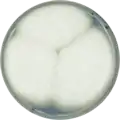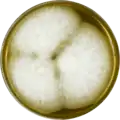Aspergillus leporis
Aspergillus leporis is an anamorph species of fungus in the genus Aspergillus.[1][2][3] It is from the Flavi section.[4] The species was first described in 1979.[5] It has been isolated from the dung of Lepus townsendii.[6] Aspergillus leporis produces leporin A and leporin B.[3][7][8] It has also been reported to produce antibiotic Y, kojic acid, and pseurotin.[4]
| Aspergillus leporis | |
|---|---|
| Scientific classification | |
| Kingdom: | Fungi |
| Division: | Ascomycota |
| Class: | Eurotiomycetes |
| Order: | Eurotiales |
| Family: | Trichocomaceae |
| Genus: | Aspergillus |
| Species: | A. leporis |
| Binomial name | |
| Aspergillus leporis States & M. Christensen (1966)[1] | |
Growth and morphology
A. leporis has been cultivated on both Czapek yeast extract agar (CYA) plates and Malt Extract Agar Oxoid® (MEAOX) plates. The growth morphology of the colonies can be seen in the pictures below.
 Aspergillus leporis growing on CYA plate
Aspergillus leporis growing on CYA plate Aspergillus leporis growing on MEAOX plate
Aspergillus leporis growing on MEAOX plate
References
- States, J.S.; Christensen, M. 1966. Aspergillus leporis, a new species related to A. flavus. Mycologia. 58(5):738-742
- "Aspergillus leporis". www.uniprot.org.
- "Aspergillus leporis States et Christensen, anamorph ATCC ® 16490&t". www.lgcstandards-atcc.org.
- Varga, J.; Frisvad, J.C.; Samson, R.A. (2011). "Aflatoxin producing species, and an overview of Aspergillus section Flavi". Studies in Mycology. 69 (1): 57–80. doi:10.3114/sim.2011.69.05. PMC 3161756. PMID 21892243.
- Bartoli, A.; Maggi, O. 1978. Four new species of Aspergillus from Ivory Coast soil. Transactions of the British Mycological Society. 71(3):383-394
- Rodrigues, P.; Santos, C.; Venancio, A. T.; Lima, N. (2011). "Species identification of Aspergillus section Flavi isolatesfrom Portuguese almonds using phenotypic, including MALDI-TOF ICMS, and molecular approaches". Journal of Applied Microbiology. 111 (4): 877–892. doi:10.1111/j.1365-2672.2011.05116.x. PMID 21790915.
- TePaske, Mark R.; Gloer, James B.; Wicklow, Donald T.; Dowd, Patrick F. (October 1991). "Leporin A: an antiinsectan N-alkoxypyridone from the sclerotia of Aspergillus leporis". Tetrahedron Letters. 32 (41): 5687–5690. doi:10.1016/S0040-4039(00)93530-5.
- Atta-ur-Rahman (2015). Studies in Natural Products Chemistry, Band 44. Elsevier. ISBN 978-0-444-63470-2.
Further reading
- States, Jack S.; Christensen, Martha (September 1966). "Aspergillus leporis, a New Species Related to A. flavus". Mycologia. 58 (5): 738. doi:10.2307/3756848. JSTOR 3756848.
- Powell, edited by Keith A.; Renwick, Annabel; Peberdy, John F. (1994). The Genus Aspergillus from taxonomy and genetics to industrial application. New York: Plenum Press. ISBN 978-1-489-90981-7.CS1 maint: extra text: authors list (link)
- Machida, edited by Masayuki; Gomi, Katsuya (2010). Aspergillus : molecular biology and genomics. Wymondham, Norfolk, UK: Caister Academic. ISBN 978-1-904-45553-0.CS1 maint: extra text: authors list (link)
- Ayres, edited by G.F. Pegg & P.G. (1988). Fungal infection of plants : symposium of the British Mycological Society (Repr. ed.). Cambridge: Cambridge University Press. ISBN 978-0-521-32457-1.CS1 maint: extra text: authors list (link)
This article is issued from Wikipedia. The text is licensed under Creative Commons - Attribution - Sharealike. Additional terms may apply for the media files.